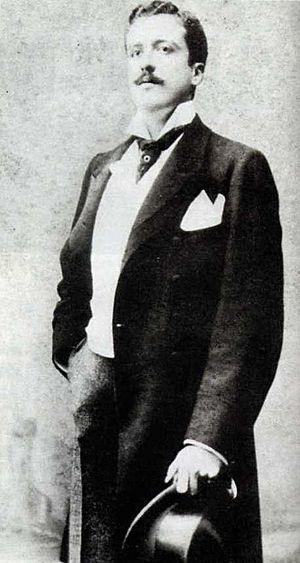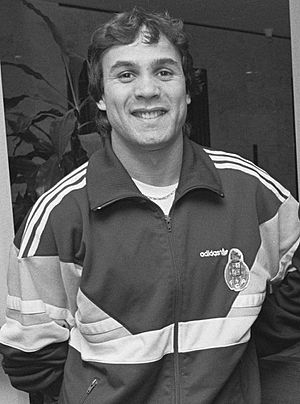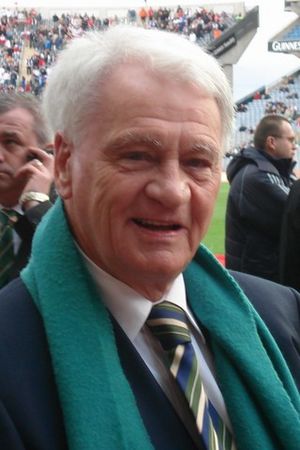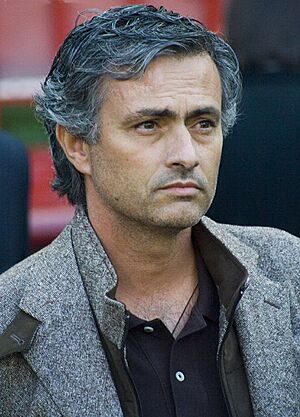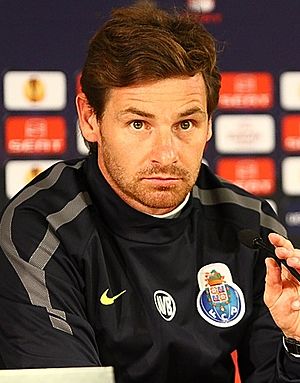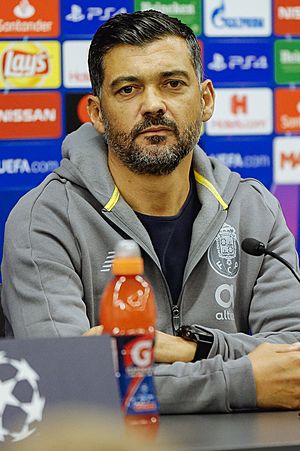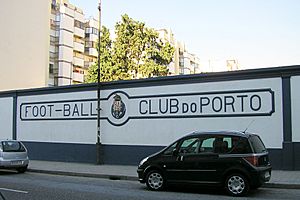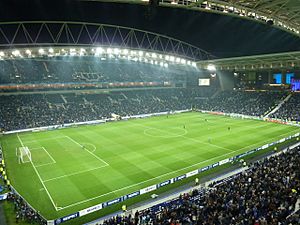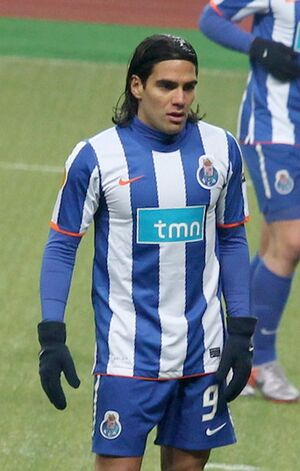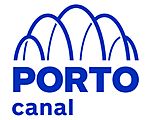FC Porto facts for kids
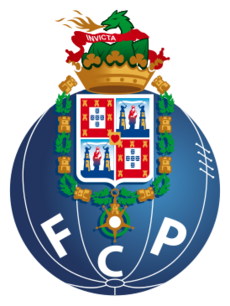 |
||||
| Full name | Futebol Clube do Porto | |||
|---|---|---|---|---|
| Nickname(s) | Dragões (Dragons) Azuis e brancos (Blue and whites) Portistas (supporters) |
|||
| Short name | Porto | |||
| Founded | 28 September 1893 (disputed) as Foot-Ball Club do Porto | |||
| Ground | Estádio do Dragão | |||
| Capacity | 50,033 | |||
| President | André Villas-Boas | |||
| Head coach | Francesco Farioli | |||
| League | Primeira Liga | |||
| 2024–25 | Primeira Liga, 3rd of 18 | |||
|
||||
Futebol Clube do Porto, often called FC Porto or just Porto, is a famous Portuguese sports club. It is based in the city of Porto. The club is best known for its professional football team. This team plays in the Primeira Liga, which is the top football league in Portugal.
Porto was started on 28 September 1893. It is one of the "Big Three" teams in Portugal. The other two are Lisbon-based rivals Benfica and Sporting CP. These three teams have played in every season of the Primeira Liga since it began in 1934. Porto's nicknames are dragões (Dragons), because of the dragon on their club badge, and Azuis e brancos (Blue-and-whites), which are their shirt colours. Their supporters are called portistas. Since 2003, Porto has played its home games at the Estádio do Dragão. This stadium replaced their old home, the Estádio das Antas, which was 51 years old.
Porto is one of the most successful clubs in Portuguese football. They have won 86 major trophies. In Portugal, they have won 30 Portuguese league titles. Five of these were won in a row from 1994–95 to 1998–99, which is a record! They also have 20 Taça de Portugal cups, 4 Campeonato de Portugal titles, 1 Taça da Liga cup, and a record 24 Supertaça Cândido de Oliveira trophies. Porto is one of only two teams to win the league title without losing a single game. They did this in the 2010–11 and 2012–13 seasons. In 2010–11, they won the league by a huge 21 points, which was the biggest difference ever. They also won four trophies that season, which is called a quadruple.
In international competitions, Porto has won seven trophies, making them the most successful Portuguese team outside Portugal. They won the European Cup/UEFA Champions League in 1987 and 2004. They also won the UEFA Cup/Europa League in 2003 and 2011. Other international wins include the UEFA Super Cup in 1987 and the Intercontinental Cup in 1987 and 2004. Porto is the only Portuguese club to have won the UEFA Cup/Europa League, the UEFA Super Cup, and the Intercontinental Cup. They are also the only Portuguese team to win a continental treble. This means winning their domestic league, domestic cup, and a European title all in one season. They did this twice: in 2002–03 and 2010–11. Porto has played in the UEFA Champions League group stage 23 times, which is the third-most appearances, behind Barcelona and Real Madrid. In UEFA's all-time club ranking, Porto is 9th.
Contents
- Club History
- Starting Years (1893–1921)
- First National Titles (1921–1977)
- International Success (1977–1988)
- Winning Streaks (1988–2001)
- Mourinho's Golden Years (2001–2004)
- After Mourinho (2004–2010)
- Villas-Boas and Later Years (2010–2017)
- Conceição Era (2017–2024)
- New Club President, André Villas-Boas (2024 – present)
- Club Badge and Kit
- Home Stadiums
- Rivalries
- Records and Statistics
- Honours
- Players
- Club Staff
- Club Structure
- Club Media
- Other Sports at FC Porto
- See also
Club History
Starting Years (1893–1921)
The club was founded on 28 September 1893. It was first called Foot-Ball Club do Porto. The founder was António Nicolau de Almeida, a local merchant who loved sports. He became very interested in football during his trips to England. Porto played its first games against other Portuguese clubs. One match was against Lisbon's Foot-Ball Club Lisbonense on 2 March 1894. King Carlos I and Queen Amélie of Orléans even came to watch this game. They traveled to Porto to see the match and give a trophy to the winners.
Almeida's involvement with the club lessened over time. By the early 1900s, Porto was not very active. In 1906, José Monteiro da Costa came back to Porto after studying in England. He also loved English football. He and some friends decided to bring football back to the city. On 2 August 1906, Porto was restarted, and Monteiro da Costa became its president. Besides football, the club also supported other sports like gymnastics, weightlifting, wrestling, athletics, and swimming. Soon after, Porto rented its first field and hired a French coach, Adolphe Cassaigne. He stayed with the club until 1925.
On 15 December 1907, Porto played its first game against a foreign team, hosting Spain's Real Fortuna. The next month, Porto visited Spain for its first away international match. Four years later, the club won the first José Monteiro da Costa Cup. This was their first big title. In 1912, Porto worked with Leixões to create the Porto Football Association. This group started organizing the regional championship the next year. Porto finished second in the first season, behind local rivals Boavista. But in the next season, they won their first championship. By the end of the 1920–21 season, Porto had won the regional championship six times in seven years. They also won the Taça José Monteiro da Costa outright after winning it three times in a row by 1916.
First National Titles (1921–1977)
The 1921–22 season saw the start of the first national football competition. It was called the Campeonato de Portugal. This tournament was organized by the national federation. It brought together the winners of regional championships to find the Portuguese champion. Porto won its fourth regional title in a row. Then, they beat Sporting CP in the first edition to become the first national champions. While they were strong regionally, they faced tougher teams nationally. They won the national championship only three more times in the next sixteen years (1925, 1932, and 1937).
In 1934, Porto was not allowed to play in the Campeonato de Portugal. This was because their football association did not let them release players for a match between the Porto and Lisbon regional teams. The next season, a new national competition called "Campeonato da Primeira Liga" (Premier League Championship) was started. It was also known as simply Primeira Liga. This was to have more matches each season and make Portuguese football more competitive. As the regional champion, Porto played in the first edition of this new league. They won it with 10 victories in 14 matches. Because this new format was so successful, the Primeira Liga became an official championship for the 1938–39 season. Its name changed to "Campeonato Nacional da Primeira Divisão" (First Division National Championship), or simply Primeira Divisão. It replaced the Campeonato de Portugal, which became the Taça de Portugal, the main domestic cup. Porto won the first edition of the new league and kept the title the next season.
Porto then went through a 16-year period without winning a major title. They returned to winning ways by taking the 1955–56 Primeira Divisão title. They won it because they had a better head-to-head record against Benfica. Later that season, Porto beat Torreense to win its first Taça de Portugal. This meant they achieved their first double (winning both the league and the main cup). As the Portuguese league winner, Porto played in European competitions for the first time in the 1956–57 European Cup. Their first European journey was short, ending in the first round with two losses against Spanish champions Athletic Bilbao. A year later, Porto won its second Taça de Portugal by beating Benfica 1–0 in the final. In 1958, Béla Guttmann became Porto's coach. He helped them overcome a five-point lead by Benfica to win the Portuguese League title in 1959.
After this, the club had another period without much success. The best moment was winning the 1968 Taça de Portugal final. During this time, Porto had its worst-ever league finish, ninth place in 1969–70. Their best league results were six second-place finishes. In European competitions, the club played in the Inter-Cities Fairs Cup (and later the UEFA Cup) and the Cup Winners' Cup. They never got past the third round. A very sad moment happened on 16 December 1973. During a league match, 26-year-old captain Pavão fell unconscious and later died in the hospital. The next month, Porto signed Peruvian player Teófilo Cubillas. He became one of the club's most successful players, scoring 65 goals in 108 games.
International Success (1977–1988)
The return of José Maria Pedroto as coach in the 1976–77 season marked a new era. Pedroto had led Porto to a cup win in 1968. Now, he guided Porto to its fourth cup title. The next season, he ended Porto's long wait for a league title, winning it 19 years after the last one. In Europe, Porto reached the quarter-finals of the 1977–78 Cup Winners' Cup. They even beat Manchester United along the way. In December 1981, Porto beat Benfica to win the first Portuguese Super Cup.
Pedroto came back in April 1982. This was thanks to the new club president, Jorge Nuno Pinto da Costa. Porto reached the Cup Winners' Cup final in 1984. On 16 May 1984, Porto played its first big European final in Basel. They lost 2–1 to Michel Platini's Juventus. Porto won the Taça and Supertaça that season, but lost the league to Benfica. Under coach Artur Jorge, the next season brought the Primeira Divisão title back to the club. Striker Fernando Gomes became Europe's top goalscorer for the second time.
Porto won the league title again in 1986. This meant they entered the 1986–87 European Cup. In their first game, they had their biggest European win: 9–0 against Maltese team Rabat Ajax. Porto then beat teams from Czechoslovakia, Denmark, and the Soviet Union to reach their first European Cup final against Bayern Munich. Porto was losing 1–0 until the 79th minute. Then, they scored twice in two minutes! The first goal was a famous backheel from Rabah Madjer. He then helped Juary score the second. This gave Porto a surprising win and the European Cup title. The next season, under new coach Tomislav Ivic, the club won three international trophies. They beat Ajax for the 1987 European Super Cup and Uruguay's Peñarol for the 1987 Intercontinental Cup. The 1987–88 season was one of the club's best. They also won the Taça de Portugal and the league. They scored a record number of goals (88) and finished 15 points ahead of the second-place team.
Winning Streaks (1988–2001)
After a very successful season, Porto did not win a trophy in 1988–89. Many players, like Madjer and Gomes, were injured. Gomes played his last season for Porto. He became the club's all-time top goalscorer with 352 goals in 455 matches. The club brought back Artur Jorge, who won the Primeira Divisão title the next season. He also added the Taça and Supertaça trophies in 1991. His replacement, Brazilian Carlos Alberto Silva, won two league titles in a row. He also led Porto to the first UEFA Champions League.
In the middle of the 1993–94 season, Porto hired former England manager Bobby Robson. He had been fired by Sporting CP. Porto got closer to league winners Benfica. They reached the 1993–94 UEFA Champions League semi-finals. They ended the season by beating Sporting CP in the Taça de Portugal final. In Robson's first full season, Porto won the 1994–95 Primeira Divisão title. They also beat Benfica four times to win both the 1993 and 1994 Supertaça trophies. The start of the season was sad because 26-year-old midfielder Rui Filipe died. He had scored the club's first league goal that season. Robson had health problems, so he could not lead Porto for the first few months of the 1995–96 season. But he returned in time to win the league title again. Striker Domingos Paciência was the club's top goalscorer for the second time in a row.
To replace Robson, who left for Barcelona, Porto hired former club captain António Oliveira. Under him, Porto made history by winning a third league title in a row (the Tri). They were 13 points ahead of the second-place team. The club's eighth Supertaça win over Benfica was a strong 5–0 victory. Brazilian players Artur and Mário Jardel were very good in the 1996–97 UEFA Champions League. Their goals helped Porto beat Milan in Italy and win their group without losing. Jardel also won the Bola de Prata (top scorer award) four times in a row while at Porto. In Oliveira's second and last season, Porto won the Primeira Divisão for the fourth straight season (the Tetra). This matched Sporting CP's record from the 1950s. They also won their third double after beating Braga in the 1998 Taça de Portugal Final.
For the 1998–99 season, Porto wanted Portuguese coach Fernando Santos to win the club's fifth league title in a row (the Penta). This would be a Portuguese football record. He achieved this, earning the nickname "Penta engineer." Jardel's 36 goals also won him the European Golden Shoe. Porto lost the chance to win its sixth straight league title, finishing four points behind Sporting in 1999–2000 Primeira Liga. But they beat Sporting to lift their tenth Taça de Portugal trophy. Even though they won the Portuguese cup twice in two years, they kept failing to win the league. This led to Santos leaving at the end of the 2000–01 season.
Mourinho's Golden Years (2001–2004)
Octávio Machado, a former player and assistant coach, was chosen to lead Porto back to the league title. The team started the season well with a Supertaça win against Boavista. But this was their only big success in a disappointing season. They finished third in the league, their lowest in 20 years. Losing in the 2001–02 Taça de Portugal led to Machado being fired after only 36 matches.
Two days later, Porto signed União de Leiria's coach, José Mourinho. He had worked for Porto before as an assistant to Bobby Robson. When he was introduced, Mourinho famously said that the club would win the league title next season. He kept his promise and led the club to one of its most successful seasons ever. With players like Deco, Ricardo Carvalho, Maniche, and new players from other Portuguese clubs, Porto won the 2002–03 Primeira Liga easily. They finished 11 points ahead of Benfica. The club also won the UEFA Cup, beating Celtic in a thrilling final that went into extra time. This was their second major European title. Mourinho then helped Porto achieve an amazing treble by winning the Taça de Portugal final against his old club.
The 2003–04 season started with another 1–0 win over União de Leiria, giving the club its 13th Supertaça. A few weeks later, Porto lost 1–0 to Milan in the 2003 UEFA Super Cup. Striker Hélder Postiga left, but Benni McCarthy from South Africa joined. His 20 league goals helped Porto win the league title again. He also became the league's top scorer.
Porto went straight into the group stage of the 2003–04 UEFA Champions League. They finished second in their group, losing only once to Real Madrid. They then played Manchester United in the round-of-16. Porto won 2–1 at home. In the second game at Old Trafford, they were losing 1–0 until the very last minute. But Porto scored an equalizer in the 90th minute to draw 1–1. This meant they won 3–2 on total goals and moved to the quarter-finals. The team then beat Lyon and Deportivo La Coruña to reach the Champions League final. Porto defeated Monaco 3–0 to win the club's second European Champion Clubs' Cup. A 2–1 loss to Benfica in the Taça de Portugal final, 10 days before, stopped them from winning another treble.
After Mourinho (2004–2010)
Mourinho's success made him and players like Carvalho, Ferreira, and Deco very famous. They all left the club after the Champions League win. The next season was unusual, as the club had three coaches: Luigi Delneri, Víctor Fernández, and José Couceiro. Under Férnandez, Porto won the 2004 Supertaça Cândido de Oliveira and the 2004 Intercontinental Cup. However, they lost the 2004 UEFA Super Cup to Valencia and were knocked out early from the 2004–05 Taça de Portugal. Porto won only 17 of 34 matches and lost the Primeira Liga title to Benfica by three points. During this time, Porto was involved in a corruption scandal called Apito Dourado.
In 2005–06, Dutch coach Co Adriaanse was chosen to rebuild the team. His strict tactics and new players like Lucho González and Lisandro López helped the club win the Primeira Liga title again. They also secured their fifth domestic double by beating Vitória de Setúbal in the Taça de Portugal final. Adriaanse's success at home did not carry over to the Champions League, where Porto finished last in their group.
The club started the 2006–07 season with a new coach, Jesualdo Ferreira. Before Ferreira took over, Porto won the Supertaça with former player Rui Barros as temporary coach. Ferreira was an experienced coach but had never won a major club trophy. In his first season at Porto, he became national champion for the first time. The 2006–07 Primeira Liga title was won on the very last day. Porto finished one point above Sporting and two above Benfica. The next season, the club won the league for the third time in a row (the Tri). López was the top goalscorer. However, they lost the Taça and Supertaça finals to Sporting CP. In May 2008, because of the Apito Dourado match-fixing scandal, Porto was fined and lost six points. Pinto da Costa was suspended for two years. Porto did not appeal this decision.
Porto won their sixth league and cup double in the 2008–09 season. They were on track to match the Penta from the late 1990s. But Benfica broke their winning streak in the next season. Even though Ferreira won his first Supertaça and defended the Taça de Portugal title, the team failed to win a fifth straight league title. They finished third, missing out on Champions League spots. A 3–0 loss against Benfica in the final of the Taça da Liga also contributed to his leaving at the end of the season.
Villas-Boas and Later Years (2010–2017)
André Villas-Boas, a former assistant to Mourinho, joined in spring 2010. This led to a very successful 2010–11 season. It started with a 2–0 win over Benfica for the Supertaça. Led by João Moutinho, Silvestre Varela, Falcao, and Hulk (the top scorer), Porto played very well in the Primeira Liga. They won their 25th title with five matches left, after beating Benfica in their stadium. The club also broke several records: the biggest points difference between champions and runners-up (21 points), most consecutive league wins (16), and the highest percentage of points (93.33%). They lost only six points and finished the league without any defeats for the first time.
Eight years after their 2003 win, Porto returned to the UEFA Cup (now called UEFA Europa League). They reached the final in Dublin. In an all-Portuguese final, Porto beat Braga with a goal from Falcao, who was the competition's top scorer. They lifted the trophy for the second time. Villas-Boas became the youngest coach to win a UEFA competition. Four days later, Porto won its third consecutive Taça de Portugal with a strong 6–2 score. This secured their fourth trophy of the season.
Villas-Boas left for Chelsea, and Porto hired his assistant, Vítor Pereira. For the third year in a row, the club started the season with another Supertaça title. This was followed by a 2–0 loss to Barcelona in the 2011 UEFA Super Cup. Even without Falcao's many goals (he was sold to Atlético Madrid), Porto won the Primeira Liga title again. But they were knocked out early from the Taça and Champions League. They then played in the Europa League but failed to defend their title, losing to Manchester City.
The next season, the club went further in both domestic cup competitions and the Champions League. They lost to Málaga in the last-16 round. In the 2012–13 Primeira Liga, Porto closed the gap to leaders Benfica. In a dramatic turn, Porto won with a goal in stoppage time in the second-to-last match. This moved them to the top of the league. An away victory in the last game confirmed their third straight league title (the Tri) and Porto's 27th league title. It was also their second league title without any defeats.
Porto started the 2013–14 season with a new coach, Paulo Fonseca. They continued their trend of winning the Supertaça. This title was the highlight of the season, as the club did not perform well in other competitions. In the league, Porto was leading by five points. But a series of bad results pushed them down to third place, and Fonseca was fired. They failed to get past the Champions League group stage. Porto reached the Europa League quarter-finals, where they lost 4–1 to Sevilla. In the following weeks, two semi-final losses against Benfica stopped them from reaching the finals of the Taça de Portugal and Taça da Liga.
Porto started the 2014–15 season with their biggest budget ever, hiring Spanish coach Julen Lopetegui. Despite signing many new players, they did not win any trophies. This was the longest period without a trophy during Pinto da Costa's time as president. They also had their biggest defeat in European competitions (6–1 against AEK Athens) and their biggest loss in the UEFA Champions League (6–1 against Bayern Munich). Porto continued their losing trend in the 2015–16 season, making it the second season in a row without a trophy. José Peseiro replaced Julen Lopetegui in January 2016. After the season, Peseiro was replaced by Nuno Espírito Santo.
Conceição Era (2017–2024)
In the 2017–18 season, after almost five years without winning any trophy, Porto won their 28th league title. This was thanks to coach Sérgio Conceição, who used to play for the club. The next year, in the 2018–19 UEFA Champions League, Porto reached the quarter-finals. But they lost 6–1 on total goals to Liverpool, who went on to win the competition.
In the 2019–20 season, Porto won the league title for the 29th time. They also won the Portuguese cup, which was their first cup win in eleven years. However, despite their success in Portugal, FC Porto did not reach the Champions League group stage and did not do well in the Europa League.
In the 2020–21 UEFA Champions League round of 16, Porto won against Juventus on away goals (4–4 total score). This sent them to the quarter-finals. However, the season ended with only one national trophy, the Supertaça.
Porto had lost the national title to Sporting in the previous season. But the 2021–22 season saw them achieve many successes in Portugal. With Conceição as coach for the fifth season in a row, the team won back the Primeira Liga. They set a record of 91 points. During the season, the Dragons also set a new record for the longest unbeaten run in the league, with 58 matches. This streak had started in the first half of the 2020–21 season. One week after the league ended, they added the domestic cup. This gave Conceição his second double as coach.
On 28 January 2023, still under Conceição, Porto won their first ever Taça da Liga title on their fifth try. They beat Sporting CP in the final. This meant they had won every national trophy available. On 17 December 2023, the team qualified for the 2025 FIFA Club World Cup for the first time. They were the highest-ranked Portuguese club in the UEFA 4-year ranking. At the end of the 2023–2024 season, after winning the Taça de Portugal and coaching the team for seven years, Conceição left the club. This happened because André Villas-Boas, the newly elected president, made the decision.
New Club President, André Villas-Boas (2024 – present)
On 27 April 2024, André Villas-Boas was elected the 32nd president of Futebol Clube do Porto. He had coached Porto during the 2010–2011 season. He won the election with 80% of the votes. Villas-Boas wanted to make changes right away. He chose Vitor Bruno as the new coach. Bruno had been an assistant coach under Sérgio Conceição at Porto. Villas-Boas also started the first women's football team for FC Porto. He encouraged young players from the B team and U-19 teams to join the main team. He also created new ways to bring fans closer to the club.
Club Badge and Kit
| Period | Kit manufacturer | Shirt sponsor |
|---|---|---|
| 1975–1983 | Adidas | — |
| 1983–1997 | Revigrés | |
| 1997–2000 | Kappa | |
| 2000–2003 | Nike | |
| 2003–2008 | PT | |
| 2008–2011 | TMN | |
| 2011–2014 | MEO | |
| 2014–2015 | Warrior | |
| 2015–2016 | New Balance | — |
| 2016–2018 | MEO | |
| 2018–2019 | Altice | |
| 2019–2022 | MEO | |
| 2022– | Betano |
The club's first badge was made in 1910. It was an old blue football with white lines. The club's initials were in white on it. On 26 October 1922, the badge was changed to how it looks today. This happened after the club approved a design by Augusto Baptista Ferreira, also known as "Simplício." He was an artist and one of the club's players. In his design, the city's coat of arms was added on top of the old badge. This pushed the white letters down.
In 1906, the club's first official team wore kits with different colours. These included white shirts with red collars or blue stripes, and even red shirts. The team's uniform was finally decided in 1909. Monteiro da Costa suggested that players should wear "a shirt with blue vertical stripes, black shorts, and personal footwear." Some people thought the kit should have the city's colours, green and white. But Monteiro da Costa believed the colours "should be those of the country's flag, not the city's flag." He hoped the club would "defend the good name of Portugal, not just the city, in sports against foreign teams."
In 1975, Adidas became the first company to make kits for the club. Eight years later, Porto was the first Portuguese team to have a shirt sponsor. They signed a deal with Revigrés for 10 million escudos per year. This deal lasted for 20 years. After that, the national communications company Portugal Telecom (PT) became the new shirt sponsor. Revigrés is still one of the club's main and longest-serving partners.
Home Stadiums
The club's first home ground was the Campo da Rainha (Queen's Field). It opened in 1906 with a game against Boavista. This field was near Monteiro da Costa's home. It was owned by the city's gardening society. Monteiro da Costa rented a part of the land to create the first special football pitch in Portugal. The field could hold 600 people, including a VIP area. It also had a changing room with showers, a bar, and a gym. The first match between Porto and a foreign team happened at the Campo da Raínha on 15 December 1907. Porto played against Spanish team Real Fortuna.
By 1911, the Campo da Raínha was becoming too small. More and more people were coming to watch games. The club found a new field near Constituição street. They rented it for 350 escudos a year. The Campo da Constituição (Constitution Field) opened in January 1913. It hosted Porto's home matches for the regional championship. This new field also became too small for the growing crowds. Especially for games against big teams. So, between the 1920s and 1940s, Porto sometimes played at other fields. These included the Campo do Ameal or the Estádio do Lima. It was at the Estádio do Lima that the club had a very important win. They beat English champions Arsenal 3–2 in a friendly match on 7 May 1948.
In 1933, Porto decided to build a new stadium for more fans. But the project only started in 1947 when they bought land in the eastern part of the city. The construction of the Estádio do Futebol Clube do Porto began in January 1950. It was better known as Estádio das Antas (Antas Stadium). It was named after the neighbourhood where it was built. Two years later, on 28 May 1952, the stadium opened. The President of Portugal was there. Porto played Benfica, but lost 2–8. The stadium was changed over the years to hold more people. By 1986, it could hold 95,000 fans. But later, for safety reasons, individual seats were added. This brought the capacity down to 55,000 by 1997.
Portugal was chosen to host the UEFA Euro 2004 football tournament in 1999. This was a great chance for Porto to get a new, modern stadium. The club decided to build a completely new stadium. It was located close to the Estádio das Antas. The new stadium cost €98 million to build and took two years. President Pinto da Costa named it Estádio do Dragão (Dragon Stadium). This was because of the dragon on the club's badge. It officially opened on 16 November 2003 with a match against Barcelona. Porto won 2–0 in front of 52,000 fans. This game also saw the first professional match for Lionel Messi. In June 2004, the stadium hosted the opening ceremony and match of UEFA Euro 2004, plus four other games. The most fans at an official match was 50,818 on 21 April 2004. Porto drew with Deportivo La Coruña in the Champions League semi-finals. For safety, its current capacity is 50,431.
Club Museum
On 28 September 2013, the FC Porto Museum opened. This was on the club's 120th birthday. The museum has an auditorium, a club shop, a coffeehouse, and areas for learning and special exhibitions.
Rivalries
Porto's biggest rivalries are with the other "Big Three" teams: Benfica and Sporting CP. These rivalries come from the history and culture between the cities of Porto and Lisbon. Benfica and Sporting are both based in Lisbon. These rivalries became stronger after Pinto da Costa became Porto's president in 1982. He often spoke about the differences between Porto and Lisbon. After this, Porto started to become the strongest team in Portuguese football. Before that, Benfica and Sporting had been the main powers since the 1940s.
For Porto, the rivalry with Benfica is the strongest and most exciting. It brings together the most important football clubs from each city. They are also the most successful Portuguese clubs. The first match between Porto and Benfica, known as O Clássico (The Classic), happened on 28 April 1912. Benfica won 8–2. Porto's first win (3–2) came in 1920. By the end of the 2014–15 season, the clubs had played 232 official matches. Porto won 89, Benfica won 86, and there were 57 draws.
The first game between Porto and Sporting CP was on 30 November 1919. It was a friendly tournament organized by Porto. Their first official game was in the final of the first Campeonato de Portugal in 1922. Porto won 2–1 and went on to win their first national title. Since then, the clubs have played 221 official matches. Porto won 80, Sporting CP won 78, and there were 63 draws. Even with the rivalry, both clubs formed an alliance against Benfica in 2017.
The club also has a strong rivalry with city rivals Boavista. This match is called Dérbi da Invicta.
Records and Statistics
Former defender João Pinto has played the most matches for Porto in all competitions (587). He also played the most games in the Primeira Liga (408). Former goalkeeper Vítor Baía has played the most international matches (99). Baía has also won the most trophies, with 25 titles during his time at Porto. Portuguese striker Fernando Gomes is the club's all-time top goalscorer in all competitions (352 goals). He also scored the most league goals (288). In European competitions, Porto's record goalscorer is Radamel Falcao, with 22 goals.
José Maria Pedroto was the coach for the longest time, leading the team for 327 matches over nine seasons. Jesualdo Ferreira was the first Portuguese coach to win three league titles in a row (2006–2009). André Villas-Boas won the 2010–11 UEFA Europa League. This made him the youngest coach ever to win a European competition.
The 2010–11 season was amazing for records. Porto played the most matches (58) and won the most games (49). They had a winning percentage of 84.4%. In the league, they had the most consecutive wins (16) and did not lose any games. In Europe, the club won 14 of 17 matches and scored 44 goals on their way to the UEFA Europa League title. This was one of a record-matching four trophies that season.
In April 2022, Porto set a national record of 58 matches without losing in the Primeira Liga. This streak ended when they lost 1–0 to Braga. The team also matched the same unbeaten league run (58) as AC Milan and Olympiacos in their leagues.
Recent Successes
In recent years, Porto has continued to be very successful. They won the Primeira Liga in 2017–18, 2019–20, and 2021–22. They also won the Taça de Portugal in 2019–20, 2021–22, 2022–23, and 2023–24. In 2022–23, they won their first ever Taça da Liga. They also regularly compete in the UEFA Champions League.
UEFA Club Ranking
Porto is currently ranked 18th in the UEFA club coefficient rankings. This shows how well they have performed in European competitions over the past five seasons.
Honours
As of 3 August 2024, Porto has won 86 major trophies in senior football. In Portugal, they have won 30 Portuguese league titles, 20 Taça de Portugal cups, 1 Taça da Liga cup, 4 Campeonato de Portugal titles (a record shared with Sporting CP), and a record 24 Supertaça Cândido de Oliveira trophies. Porto is the most successful Portuguese team in international competitions. They have won two European Cup/UEFA Champions League titles, two UEFA Cup/UEFA Europa League titles, one UEFA Super Cup, and two Intercontinental Cup trophies. They are the only Portuguese team to have won the UEFA Cup/UEFA Europa League, the UEFA Super Cup, or the Intercontinental Cup.
Porto has won four titles in a single season twice. This happened in 1987–88 (UEFA Super Cup, Intercontinental Cup, Primeira Liga, and Taça de Portugal) and in 2010–11 (Supertaça, Primeira Liga, UEFA Europa League, and Taça de Portugal). The 2010–11 season also included the club's second continental treble. The first treble was in 2002–03 (Primeira Liga, Taça de Portugal, and UEFA Cup). The club also reached the Cup Winners' Cup final in 1983–84 (losing to Juventus). They also played in three more UEFA Super Cup finals (2003, 2004, and 2011).
| Type | Competition | Titles | Seasons |
|---|---|---|---|
| Domestic | Primeira Liga | 30 |
1934–35, 1938–39, 1939–40, 1955–56, 1958–59, 1977–78, 1978–79, 1984–85, 1985–86, 1987–88, 1989–90, 1991–92, 1992–93, 1994–95, 1995–96, 1996–97, 1997–98, 1998–99, 2002–03, 2003–04, 2005–06, 2006–07, 2007–08, 2008–09, 2010–11, 2011–12, 2012–13, 2017–18, 2019–20, 2021–22 |
| Taça de Portugal | 20 |
1955–56, 1957–58, 1967–68, 1976–77, 1983–84, 1987–88, 1990–91, 1993–94, 1997–98, 1999–2000, 2000–01, 2002–03, 2005–06, 2008–09, 2009–10, 2010–11, 2019–20, 2021–22, 2022–23, 2023–24 |
|
| Taça da Liga | 1 |
2022–23 |
|
| Supertaça Cândido de Oliveira | 24 |
1981, 1983, 1984, 1986, 1990, 1991, 1993, 1994, 1996, 1998, 1999, 2001, 2003, 2004, 2006, 2009, 2010, 2011, 2012, 2013, 2018, 2020, 2022, 2024 |
|
| Campeonato de Portugal | 4s |
1921–22, 1924–25, 1931–32, 1936–37 |
|
| Continental | European Cup / UEFA Champions League | 2 | 1986–87, 2003–04 |
| UEFA Cup / UEFA Europa League | 2 | 2002–03, 2010–11 | |
| UEFA Super Cup | 1 | 1987 | |
| Worldwide | Intercontinental Cup | 2 | 1987, 2004 |
- record
- s shared record
Players
Current Squad
|
|
Other Players Under Contract
|
|
Players Out on Loan
|
Club Staff
Coaching Team
Last updated: 11 July 2025 |
Club Leadership
Last updated: 17 September 2024 |
Club Structure
After becoming a public company in 1997, Porto created several smaller companies. These help manage different parts of the club:
- FC Porto – This part handles youth football, basketball, handball, roller hockey, athletics, the club's magazine, and more.
- FC Porto – Futebol SAD – This is the company for professional football. SAD stands for Sociedade Anónima Desportiva, which means a sports public limited company.
- Porto Estádio – This company manages the stadium.
- Porto Multimédia – This handles the official website and other digital products.
- Porto Comercial – This deals with selling club merchandise.
- Porto Seguro – This is for insurance.
The FCPorto SAD company is listed on the Euronext Lisbon stock exchange.
Club Media
Porto Canal is a television channel owned by Porto. It shows general programs, regional news, and content about the club. You can watch it on cable, satellite, and IPTV. The channel broadcasts live games of the reserve and youth football teams. It also shows live games of the senior basketball, handball, and roller hockey teams. The channel started in 2006. In 2011, Porto began managing it, and on 17 July 2015, the club fully bought and took over the channel.
The club also publishes Dragões, which is an official monthly magazine. It has articles and interviews about the teams, players, and other club news. There is also a daily newsletter called Dragões Diário.
Other Sports at FC Porto
Active Sports Sections
|
Discontinued Sports Sections |
See also
 In Spanish: Fútbol Club Oporto para niños
In Spanish: Fútbol Club Oporto para niños
- List of world champion football clubs
 | Delilah Pierce |
 | Gordon Parks |
 | Augusta Savage |
 | Charles Ethan Porter |


